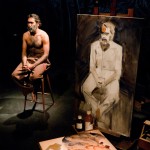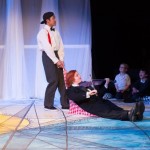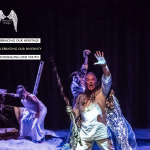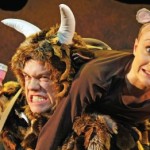Genre: Cabaret and Burlseque
Venue: Leicester Square Theatre 6 Leicester Place, London WC2H 7BX
Low Down
Every element of Ty Jeffries’ performance of Miss Hope Spring is done in style: that is, in the style of cabaret, female impersonation and solo performer in the spotlight. The realisation of a character from a bygone era of 1960s variety shows, who is forever on the brink of become ‘a star’, is absolutely engaging from start to finish.
The show begins with Miss Hope Springs having to manoeuvring the tiny stage space of the Leicester Square Theatre basement studio, which Ty Jeffries uses with gusto and finesse to show Miss Hope’s indomitable sense of optimism as she retells the vagaries of life pursuing a less than stellar career. Her first revelation to the audience is that her husband, Irving, has left after thirty years for a gorgeous twenty-seven year old. The turning of the joke to reveal that the younger woman is, in fact, a man is sprung on the audience with a perfect sense of timing. It is wonderful moment, one of many which throughout the show brings the gender politics of traditional and gay marriages present yet never mentioned.
Review
Miss Hope Springs…Sings Her Songs is poised on building stories around well-known stars of the era like Shirley Maclaine linked with other names of lesser stars such as Tab Hunter. The constellation of brighter and smaller lights makes the stories strangely credible. Its clear to see contemporaries of Miss Hope in the audience nodding at her allusions of flamboyant celebrity pool parties of the 1960s as well as their quiet thoughtfulness when she wonders where might such promising careers have gone.
Such a range of emotions makes for a show of considerable depth and interest in which the 12 songs are set to equally great effect. Through them, we come to know Miss Hope ‘the Star’ as she gives us as a seemingly private view of what she might have been. To do this, the lyrics of each song reveal lost love and innocence set against a gritty defiance of Miss Hope’s character.
Equally, the arrangement of Jeffries’ music through the composer’s blending of keyboard, drums and double bass is highly accomplished. The dynamics are continuously refreshing to listen to as Sam Glasson works magic through his drums and Nigel Thomas evokes the deep undertones of his bass.
It would be too easy perhaps to compare Miss Hope to other would-be stars such as Dame Edna Everage. However, Edna is far more in line with the sharp-tongued dame of the pantomime tradition. Miss Hope Springs is a ‘new woman’, altogether far more sympathetic to the character of the unrealised star whose talent remains unnoticed. Consequently, she is more heroic in her quest ‘to be herself’.
In the final moments of the show, when she reveals that she will not be returning to her errant husband but has decided instead to live on her own, she seems completely resolved. The moment hangs in the air with its many, many ironies: not the least perhaps because by the end of the show Miss Hope seems to represent the unfulfilled lives of her generation of ‘baby boomers’ who, once the wild children of the 1960s, now find themselves in middle age remembering their near-accomplishments and many adventures.
Reviewed by Josey De Rossi 2 February 2012
Website :
http://www.leicestersquaretheatre.com/home





